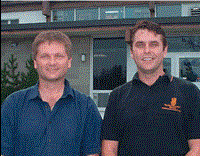"If at first the idea is not absurd, then there is no hope for it," states a plaque with Albert Einstein's name below.
It hangs upon the wall in the reception area of HLS Hard-Line Solutions Inc. and owners Jamie Lachapelle and Walter Siggelkow take them to heart.
Their radio-remote control business and their latest innovative project, a digital mine communication system, has earned them the 2005 Northern Ontario Business Award for Innovation.
What began as an idea over a beer nine years ago has flourished into a prosperous business that services a vast international market, including mining giants in its own backyard, like Falconbridge and Inco.
"It was a bunch of guys sitting around laughing about how bad the equipment was we were working on, and how easy it would be to improve it," Siggelkow says.
What made their situation favourable was their ability to do service work while they developed their product. They were able to pay some of the bills while spending hours in the field working with potential customers, ascertaining exactly what they would like to see in a product.
"Our core product, radio remote control, was not designed at a desk," Siggelkow says. "It was designed and built by a collaboration of knowledge by 100 to 200 people in the field."
Their first prototype system was installed after eight months of development. They didn't look back. The company has expanded their product base and is a world-leader with their newer line called digital communication system (DCS), which is a replacement for underground mining communication systems. As a non-proprietary system based on the Ethernet standard, it will replace existing multiple systems, which can be as many as seven at a single site.
"The mines wanted to bring it into one technology and one core team of people supporting one system," Siggelkow says.
Lachapelle and Siggelkow have been working with Inco on this project for two-and-a-half years now. Right now mines in Chile are looking at the system, and Peru's Atacocha Mine in installing the second phase of the DCS.
HLS staff work out of a 13,000-square-foot facility in an unassuming community called Dowling, part of the City of Greater Sudbury. With a staff of 35, including international distributors, Siggelkow says they have about 500 systems out in the world. They also carry a significant accounts receivable balance, and inventory worth approximately $600,000 to $700,000.
One of the reasons for their success is that Lachapelle and Siggelkow are equally driven with the same goals. As risk-takers, they enjoy what they do and are not afraid to work long hours to bring a project to fruition.
"This company would not exist without both of us, equally," Sigglekow says. "We enjoy working. That is the key issue."
Besides knowing their own strengths, they are aware that it takes more than money to make a company work. Hiring the right people is crucial to maintaining a successful business.
"The people who run the company are the driving force, but you'll never succeed if you don't surround yourself with more good people," Sigglekow says. "It's the people who make the company, the knowledge."
Other factors that have also led to the company's success include their focus on expanding their markets and their product base. They now serve countries in North, South and Central America, Europe, Africa and in the near future, China. Integral to expanding sales is their product development. Hard-Line Solutions devotes a third of their staff to research and development, which has put the company ahead of their time and competitors.
"We work for the next year, so by the time our competitors catch up and say they are releasing a new system, we've got the advantage to say we did that six years ago."
Hard-Line Solutions services their customers. With seven employees qualified to go underground, it is that personal touch that Sigglekow says makes a difference.
All of their products are turn key, which essentially means they look after everything for the company they are servicing from product and installation to training the workers on the equipment.
"We don'tget paid until it works," Sigglekow says.
Some notable projects in which the company is involved is the clean up of nuclear waste in Idaho where the U.S. military built reactors for nuclear submarines. The site was so contaminated that they built a building over the area to contain the radioactivity. The project is based on an amalgamation of communication and remote systems, which allows people to run the machine from outside through Hard-Line's video cameras and tele-operational system.
Another three-year project where remote teleoperation excavators and bulldozers are used is at an old military base in Calgary. Located on prime property, it has been necessary to excavate the area from potential non-detonated devices once used in military exercises.
The company is currently developing something called the miniature miner. Sigglekow says it is an extension of all the technologies being developed thus far and is designed for mining in the future when the ore veins decrease in size, while ground stresses increase. It is meant to move less material in a smaller space on a more consistent basis, operated from the surface.
Sigglekow points out that they donated one of their tele-operational devices to Dynamic Earth to support science mining-based efforts in Sudbury, but to also have a sample of their equipment accessible to the public.
As HLS Hard-Line Solutions aim to expand their business in China, they continually look at their markets today, next year and 10 years down the road.




